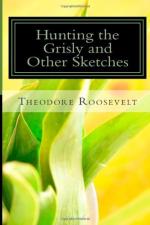There is, however, one very real danger to which the solitary bear-trapper is exposed, the danger of being caught in his own trap. The huge jaws of the gin are easy to spring and most hard to open. If any unwary passer-by should tread between them and be caught by the leg, his fate would be doubtful, though he would probably die under the steadily growing torment of the merciless iron jaws, as they pressed ever deeper into the sore flesh and broken bones. But if caught by the arms, while setting or fixing the trap, his fate would be in no doubt at all, for it would be impossible for the stoutest man to free himself by any means. Terrible stories are told of solitary mountain hunters who disappeared, and were found years later in the lonely wilderness, as mouldering skeletons, the shattered bones of the forearms still held in the rusty jaws of the gin.
Doubtless the grisly could be successfully hunted with dogs, if the latter were trained to the purpose, but as yet this has not been done, and though dogs are sometimes used as adjuncts in grisly hunting they are rarely of much service. It is sometimes said that very small dogs are the best for this end. But this is only so with grislies that have never been hunted. In such a case the big bear sometimes becomes so irritated with the bouncing, yapping little terriers or fice-dogs that he may try to catch them and thus permit the hunter to creep upon him. But the minute he realizes, as he speedily does, that the man is his real foe, he pays no further heed whatever to the little dogs, who can then neither bring him to bay nor hinder his flight. Ordinary hounds, of the kinds used in the south for fox, deer, wild-cat, and black bear, are but little better. I have known one or two men who at different times tried to hunt the grisly with a pack of hounds and fice-dogs wonted to the chase of the black bear, but they never met with success. This was probably largely owing to the nature of the country in which they hunted, a vast tangled mass of forest and craggy mountain; but it was also due to the utter inability of the dogs to stop the quarry from breaking bay when it wished. Several times a grisly was bayed, but always in some inaccessible spot which it took hard climbing to reach, and the dogs were never able to hold the beast until the hunters came up.
Still a well-trained pack of large hounds which were both bold and cunning could doubtless bay even a grisly. Such dogs are the big half-breed hounds sometimes used in the Alleghanies of West Virginia, which are trained not merely to nip a bear, but to grip him by the hock as he runs and either throw him or twirl him round. A grisly could not disregard a wary and powerful hound capable of performing this trick, even though he paid small heed to mere barking and occasional nipping. Nor do I doubt that it would be possible to get together a pack of many large, fierce dogs, trained to dash straight at the head and hold on like a vise, which could fairly master a grisly




